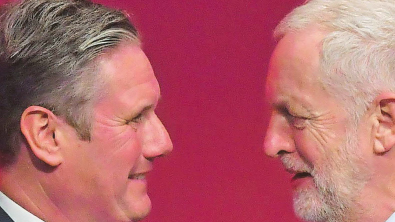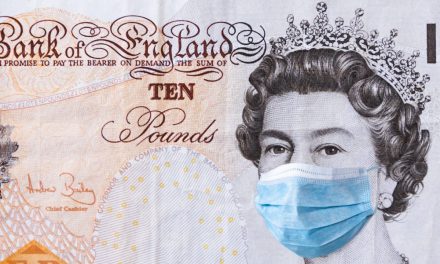Jeremy Corbyn having sacked Owen Smith, the leader of the opposition is now closer to the government on Brexit than to a majority of Labour MPs, and a vast majority of the members he claims to listen to.
Keir Starmer having made clear that no matter what the deal, no matter what the costs or consequences, there can be no revisiting the basic In or Out decision, Labour’s Brexit spokesman is now closer to Brextremists like Boris Johnson and Jacob Rees-Mogg than he is to the millions in the country who oppose Brexit but see so few in Parliament speaking up for them.
The unsacked Shadow Home Secretary Diane Abbott having made the same point as Smith about the need to put the final Brexit deal to a people’s vote, what exactly was his crime? Trying to ensure no hard border in Ireland? Daring to understand that the Good Friday Agreement isn’t about cameras and trade, but a political settlement recognising the rights of both unionists and nationalists, and that it’s wrong to undermine that? Following through on the logic of what the government signed up to in December on maintaining alignment with the rules of the customs union and the single market? Which of these things is so unpalatable to Corbyn? Does his action not remove any lingering doubt that he is just as hell-bent on Brexit-at-any-cost as Theresa May, David Davis and Liam Fox?
The key to the word ‘opposition’ is in the first five letters … add an ‘e’, and you have it. .. ‘oppose’.
Google for a dictionary definition and the first one given is this: ‘disagree with and attempt to prevent, especially by argument’. Wouldn’t it be marvellous if the current leader of the opposition could take that as a guide, insert the words ‘a hard and ruinous Brexit’ after the words ‘with’ and ‘prevent’, and have them stitched inside his cap as a permanent reminder? After all, he managed to take that kind of disciplined, oppositionalist approach in the past… insert ‘successive Labour leaders’ after ‘with’ and ‘prevent.’ Feel the difference.
The example given by Google of how this definition of the word may be used is this: ‘a majority of the electorate opposed EC membership’. EC, EU, whatever …
Definition Number 2, and the example, might be more attractive to Mr Corbyn … ‘actively resist (a person or system)’, eg ‘a workers’ movement opposed the regime’. Definition Number 3 likewise has resonance given he is now at the head of a gladiatorial parliamentary contest in our somewhat decrepit two-party system … ‘compete with (someone)’ eg ‘a candidate to oppose the leader in the presidential contest’.
Of course Corbyn opposes Theresa May in that he has different policies, doesn’t share her priorities, sometimes challenges them, and would like to replace her. But, in the context of Brexit, take a look at the ‘synonyms’ section below the definitions …
‘be against, object to, be hostile to, be anti, in opposition to, disagree with, dislike, disapprove of, resist, take a stand against, put up a fight against, stand up to, take on, fight, withstand, defy, set one’s face against, stand up and be counted against, go against, counter, cross, confront, challenge, contend with, attack, counterattack, fly in the face of, take issue with, contradict, dispute, rebut, argue with/against, quarrel with .. .’
Now go back and insert the words ‘hard Brexit’ after each of those words or phrases – it doesn’t even need to be ‘a hard Brexit which the government accepts will make us poorer, and therefore unable to afford the promises in our manifesto’, just any old Brexit- and ask where Corbyn and his front bench could realistically place a large oppositionalist tick. Maybe, just, they could be allowed one for ‘be against, object to’ but when you get into the grittier areas of ‘resist, take a stand against, put up a fight against, defy, set one’s face against, stand up and be counted against’, they are, and have been pretty much through the whole sorry business, absent from the battlefield.
Can anyone remember Labour’s line of attack/ opposition to the David DavisMichel Barnier round of talks which paved the way for last week’s European Council? I may have missed it, but I have no recollection of Corbyn bursting through my television screen or onto my social media channels. I have a vague memory of Brexit spokesman Keir Starmer being quoted towards the end of a BBC report saying it was “a step in the right direction”, prompting me to ask the radio – in these dire, crazy times I find myself talking to the radio more than usual- “a step in the right direction towards WHAT?”
A step, I fear, towards allowing Theresa May to get away with a strategy that is all about holding the Tory party together, despite the damage she knows Brexit is going to do to the country. But why on earth is the opposition helping her in that task? So off she heads to Brussels, for what the same BBC’s Katya Adler described as an “astoundingly” successful summit -astounding no less -because she secured agreement that the Russians were behind the Salisbury attack (no s**t, Sherlock) and the EU leaders signed off what Barnier had very successfully negotiated for them.
But just wind back a bit, and remember what May herself said she should be judged against when it came to the same negotiation the media was now hailing as a success, and Labour were nodding through as a “step in the right direction”. Here are the six tests she set herself, (my comments in brackets).
Having the exact same benefits, despite leaving the single market and customs union. (Not happening. She has admitted we will lose access to EU trade, and even the best estimates of additional growth from trade elsewhere will nowhere near match what we lose.)
No border on the island of Ireland or across the UK. (The issue parked. Why? Because they have found no answer to the question – how, when we are out of the EU, and Ireland remains in, can the only land border between two separate political and economic entities be free of any border infrastructure, or ‘frictionless’?)
Free Trade Agreement fully negotiated by March 2019. (Not happening.)
No payment for access to the EU market. (£40 billion, and counting.)
A complete end to EU rules and regulations. (Ask a fisherman. Ask a European Court judge. During the transition trap, the UK will have to abide by all EU rules and regulations including those agreed without our input.)
Continuation of all EU trade deals and new deals ready to come into force the day we leave. (Liam Fox has consistently claimed our 40 or so EU trade deals with 65 countries will be immediately converted into new, bespoke deals, ready to sign on exit day next year. That is the fantasy. As for a fact -yet to name a single country.)
Labour has its own six tests against which it says Brexit should be judged, though we hear precious little of them in the public debate.
Here is a reminder:
Does it ensure a strong and collaborative future relationship with the EU? (Jury out, and whatever it is it will by definition be weaker and less collaborative than now.)
Does it deliver the ‘exact same benefits’ as we currently have as members of the single market and customs union? (No.)
Does it ensure the fair management of migration in the interests of the economy and communities? (Highly unlikely.)
Does it defend rights and protections and prevent a race to the bottom? (Not if the European Reform Group driving May’s ‘party before country’ approach have their way.)
Does it protect national security and our capacity to tackle cross border crime? (It certainly doesn’t make it easier. Being in the room helped May’s Russian diplomacy this week, for sure.)
Does it deliver for all regions and nations of the UK? (No, and the government impact assessment papers make that perfectly clear.)
Starmer gave an interview to the Observer at the weekend, in which he effectively threw in the towel on any rethink in any circumstances. The interview was notable also for things he didn’t say … one, no mention of his own tests above. Two, no mention of that paper’s extraordinary investigation into data abuse, getting closer and closer to the potentially illegal nature of the Leave campaign. Labour seem to be giving the Brexiteers a free pass on that one too. So, given that even by her own words May has failed to secure her objectives, and as it is already perfectly clear that Labour’s tests are not being met, and will not be met, why are the opposition failing to oppose? When I have asked in the past, the explanation has been that the government could collapse at any moment, and Labour would be ready to step in and negotiate differently, better, after winning a mid-Brexit general election.
Unconvincing, but now also clearly wrong, being overtaken by events in which Labour have either actively conspired, or been lulled into, or a bit of both. Given the record so far, it was hard to take much comfort from Starmer’s subsequent promise to seek to strengthen the terms of the ‘meaningful vote’ being planned for MPs. Unless it includes the chance to vote to stop what most of them believe to be a huge mistake for the country, it means the lulling goes on.
Corbyn’s sacking of Smith, and Starmer’s rejection of any possibility of giving the people the right to judge the deal, confirms that government and opposition are locked in a deadly Brexit embrace; it has to happen.
Their reasons may be different, but the end result is the same; the Tories Brexit’s architect, Labour the handmaiden, and much of the country left wondering what on earth the opposition thinks it’s job actually is.
As for the politics going forward, if -highly unlikely -Brexit is a success, the Tories get the credit; if -almost certain even by their own yardsticks -it is a failure, then the two parties will share the blame. That is a situation tailor made to benefit a government governing much more than an opposition failing to oppose. Indeed, the Brexit strategy Corbyn and Co think will win them an election could well be the deciding factor that loses it for them.




